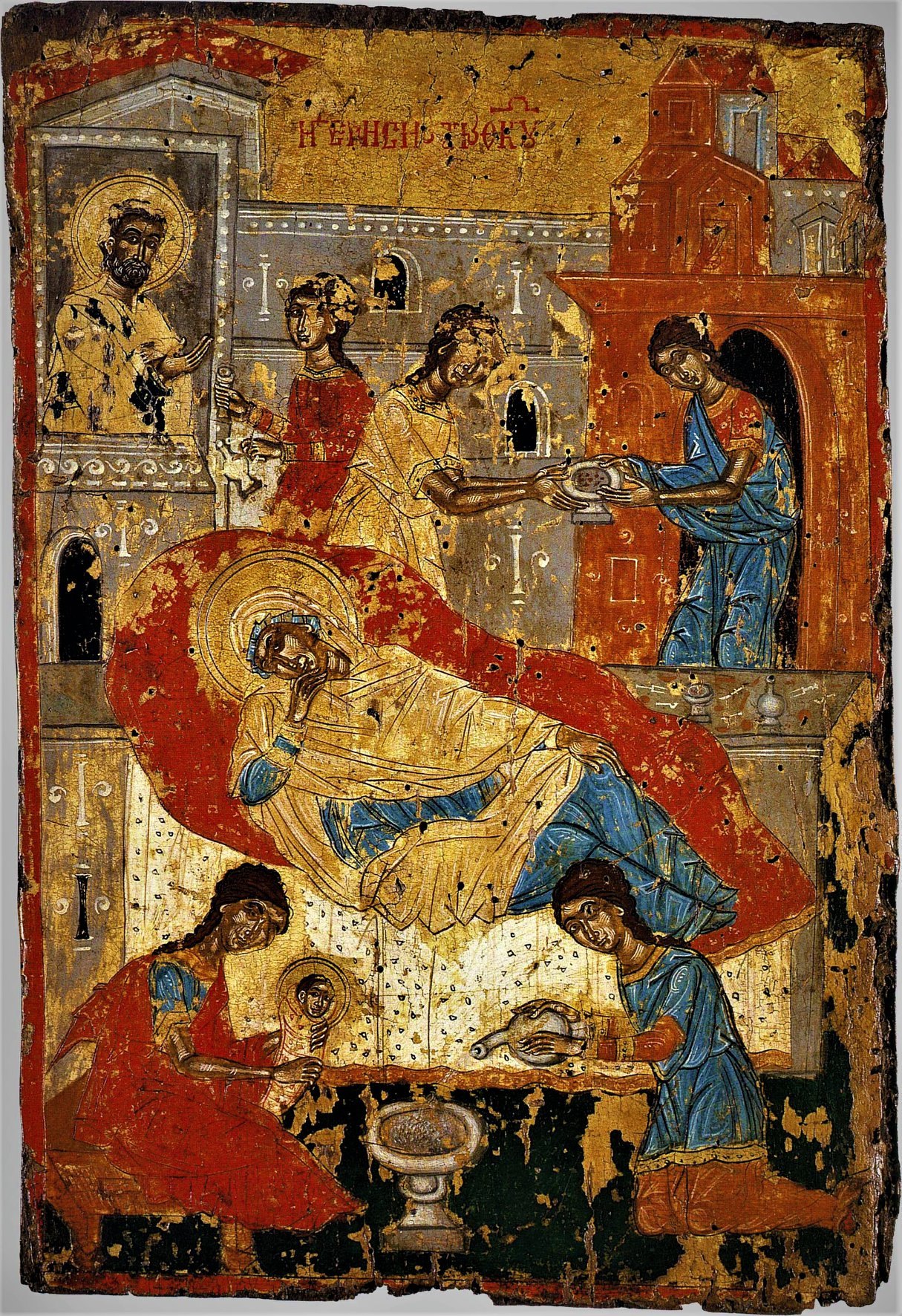 “By Your Nativity, O Most Pure Virgin, / Joachim and Anna are freed from the reproach/disgrace of barrenness (ὀνειδισμοῦ ἀτεκνίας); / Adam and Eve, from the corruption of death. / And we, your people, freed from subjection to sin (ἐνοχῆς τῶν πταισμάτων), celebrate and sing to you: / The barren woman gives birth to the Theotokos, the nourisher of our life!” (Byzantine Kontakion-hymn of the Nativity of the Theotokos)
“By Your Nativity, O Most Pure Virgin, / Joachim and Anna are freed from the reproach/disgrace of barrenness (ὀνειδισμοῦ ἀτεκνίας); / Adam and Eve, from the corruption of death. / And we, your people, freed from subjection to sin (ἐνοχῆς τῶν πταισμάτων), celebrate and sing to you: / The barren woman gives birth to the Theotokos, the nourisher of our life!” (Byzantine Kontakion-hymn of the Nativity of the Theotokos)
The services of the great feast of the Nativity of the Theotokos, celebrated this Sunday (NC), are full of difficult theological concepts, like “corruption of death” and “subjection to (liability for) sin,” referring to our human state before Christ. Even more perplexing, perhaps, is the mention of Christ annulling our “curse” in another well-known hymn of the feast: “By annulling the curse (καὶ λύσας τὴν κατάραν) He bestowed a blessing, by destroying death, He gave us eternal life,” it says in the Troparion-hymn. What does it all mean?
I am given to understand the meaning of these terms first and foremost through a story. It is the personal story of Saints Joachim and Anna, and their “disgrace of barrenness” or “childlessness.” And here’s what their story teaches me: Before God intervened and stepped into our picture, they, like me, were unable to “live” to their full potential. Without the Source of Life stepping into our nature, separated from Him through “sin” (a loss of focus), and a “curse” (a loss of “blessing” or “ev-logia,” a “good word”), we are cut off from His creative energies, which allow us to become truly productive and truly human. He becomes human, through His Most-Pure Mother, so that I can become my true self, freed from paralyzing “barrenness” and capable of giving birth to His word in my world.
So today “the barren woman gives birth,” as He bestows His same blessing on an ever God-Bearing Church. Let me embrace this blessing, by the intercessions of the Blessed Among Women, amen!
Meditation by Sr. Vassa
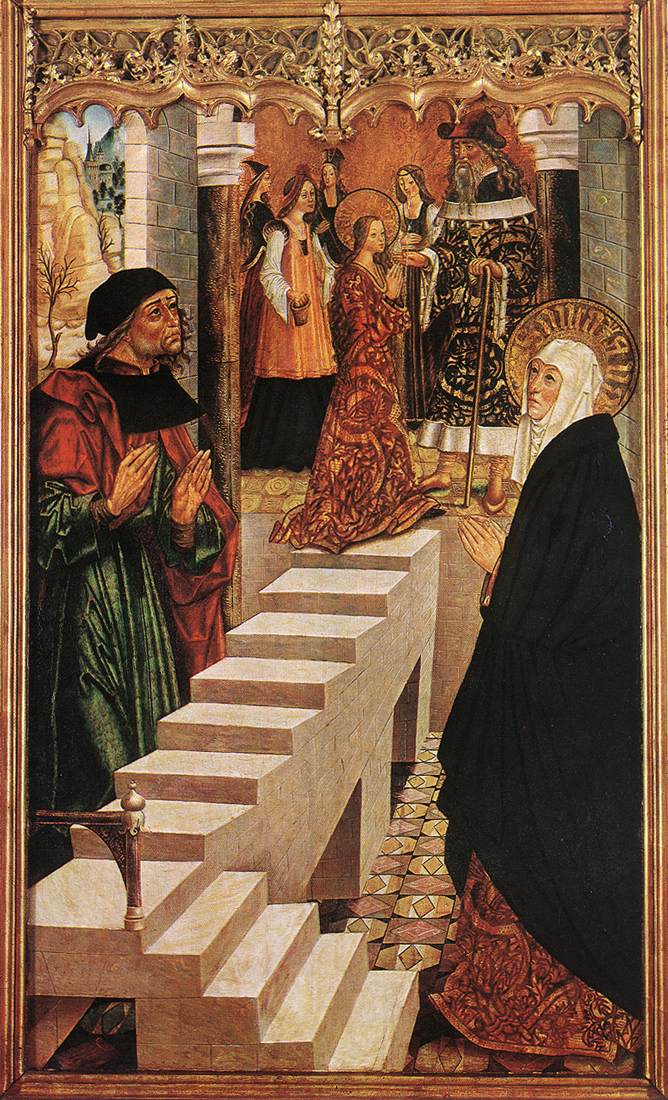 “Blessed are the blameless in the Way, who walk in the law of the Lord.” (Ps 118/119: 1, Septuagint)
“Blessed are the blameless in the Way, who walk in the law of the Lord.” (Ps 118/119: 1, Septuagint)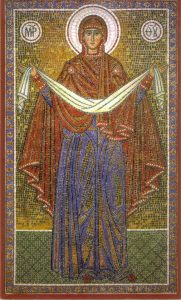 There is only one God, one Creator, one Savior, one Redeemer. Yet this one God has chosen to be friends with his creation. As St. Paul told us, he humbled himself to become a man, like us in every way except sin. There are many ways he could have become a man, but he chose to be born of a woman who in her human nature, accepted completely the will of God, so that through her God could enter into our time and our story. Then, at Cana, it was his mother, a woman, who by her plea, guided God to make wine out of water, telling the stewards, and through them, saying to all of us, “Do whatever he tells you.”
There is only one God, one Creator, one Savior, one Redeemer. Yet this one God has chosen to be friends with his creation. As St. Paul told us, he humbled himself to become a man, like us in every way except sin. There are many ways he could have become a man, but he chose to be born of a woman who in her human nature, accepted completely the will of God, so that through her God could enter into our time and our story. Then, at Cana, it was his mother, a woman, who by her plea, guided God to make wine out of water, telling the stewards, and through them, saying to all of us, “Do whatever he tells you.”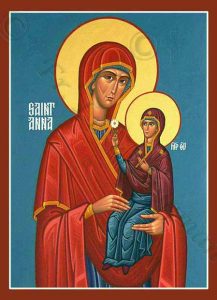
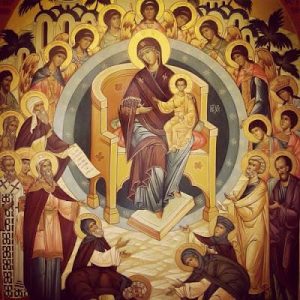 Many Byzantine feasts have a commemoration on the day after a great feast called a “synaxis,” that is, an “assembly” or “gathering” in honor of one who participated in the feast. No more honorable person could ever be found than the holy Lady, the Mother of God.
Many Byzantine feasts have a commemoration on the day after a great feast called a “synaxis,” that is, an “assembly” or “gathering” in honor of one who participated in the feast. No more honorable person could ever be found than the holy Lady, the Mother of God.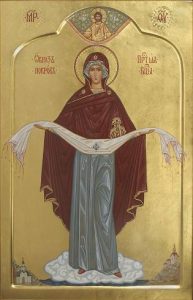 On this Sunday, we celebrate the feast of the Protection of the Theotokos. This commemorates the vision of St. Andrew, the Fool for Christ, who, during an attack, as the people kept an All-night Vigil of Prayer, saw the Mother of God holding a protecting veil over her city. We can say, then, that this feast celebrates the power of Mary, who fights on behalf of Christians, and is a mighty protector of the people. On this day we read the common Gospel from St. Luke on feasts of Mary, the story of Mary and Martha. Maybe a better gospel would be the story of the wedding at Cana in Galilee. There, at Cana, it was Jesus’ mother, a woman, who by her plea, guided God to make wine out of water, telling the stewards, and through them, saying to all of us, “Do whatever he tells you.” As his mother, she began the story of Jesus’ mission, even though he had said, “My hour has not yet come.” This truly is power given to her by God. This is still Mary’s relationship with us. She is our protector and motherly intercessor. She is the mother of all believers, for our Lord, on the cross, gave her to his beloved disciple and through him to all of us. Her message to us always, every time she appears, is “Do what my Son tells you.”
On this Sunday, we celebrate the feast of the Protection of the Theotokos. This commemorates the vision of St. Andrew, the Fool for Christ, who, during an attack, as the people kept an All-night Vigil of Prayer, saw the Mother of God holding a protecting veil over her city. We can say, then, that this feast celebrates the power of Mary, who fights on behalf of Christians, and is a mighty protector of the people. On this day we read the common Gospel from St. Luke on feasts of Mary, the story of Mary and Martha. Maybe a better gospel would be the story of the wedding at Cana in Galilee. There, at Cana, it was Jesus’ mother, a woman, who by her plea, guided God to make wine out of water, telling the stewards, and through them, saying to all of us, “Do whatever he tells you.” As his mother, she began the story of Jesus’ mission, even though he had said, “My hour has not yet come.” This truly is power given to her by God. This is still Mary’s relationship with us. She is our protector and motherly intercessor. She is the mother of all believers, for our Lord, on the cross, gave her to his beloved disciple and through him to all of us. Her message to us always, every time she appears, is “Do what my Son tells you.”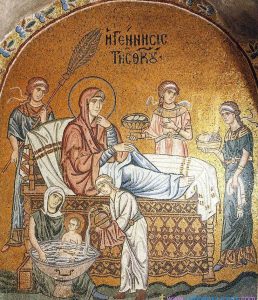 Christians of East and West can express their gratitude for today’s feast to brought to our awareness by Eastern monks. It was in the seventh century, this feast of Our Lady was celebrated by Greek Christians. The narrative of Mary’s Nativity is not testified to in sacred Scripture but known only from apocryphal sources. By the end of the seventh century this feast gained acceptance in the Diocese of Rome.
Christians of East and West can express their gratitude for today’s feast to brought to our awareness by Eastern monks. It was in the seventh century, this feast of Our Lady was celebrated by Greek Christians. The narrative of Mary’s Nativity is not testified to in sacred Scripture but known only from apocryphal sources. By the end of the seventh century this feast gained acceptance in the Diocese of Rome.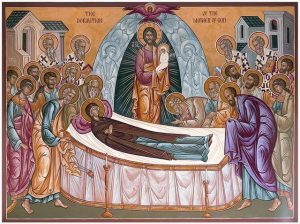 “Come, all you ends of the earth, let us praise the blessed passing of the Mother of God. She delivers her sinless soul into the hands of her Son; through her holy Dormition, the world is given new life.” (Stichera at the Litija)
“Come, all you ends of the earth, let us praise the blessed passing of the Mother of God. She delivers her sinless soul into the hands of her Son; through her holy Dormition, the world is given new life.” (Stichera at the Litija)